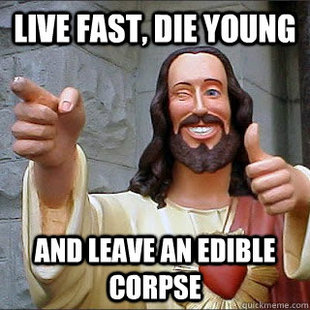After hearing a little about young Jesus from the
Gospel of Thomas, I decided to read through it for myself. I think it may suffice to say that you should neither try to be a playmate to Jesus or try to teach him the alphabet. Anyways, I picked out some of the most interesting verses and here they are!
"IV. 1 After that again he went through the village, and a child ran and dashed against his shoulder. And Jesus was provoked and said unto him: Thou shalt not finish thy course (lit. go all thy way). And immediately he fell down and died. But certain when they saw what was done said: Whence was this young child born, for that every word of his is an accomplished work? And the parents of him that was dead came unto Joseph, and blamed him, saying: Thou that hast such a child canst not dwell with us in the village: or do thou teach him to bless and not to curse: for he slayeth our children.
V. 1 And Joseph called the young child apart and admonished him, saying: Wherefore doest thou such things, that these suffer and hate us and persecute us? But Jesus said: I know that these thy words are not thine: nevertheless for thy sake I will hold my peace: but they shall bear their punishment. And straightway they that accused him were smitten with blindness. 2 And they that saw it were sore afraid and perplexed, and said concerning him that every word which he spake whether it were good or bad, was a deed, and became a marvel. And when they (he ?) saw that Jesus had so done, Joseph arose and took hold upon his ear and wrung it sore. 3 And the young child was wroth and said unto him: It sufficeth thee (or them) to seek and not to find, and verily thou hast done unwisely: knowest thou not that I am thine? vex me not."
"IX. 1 Now after certain days Jesus was playing in the upper story of a certain house, and one of the young children that played with him fell down from the house and died. And the other children when they saw it fled, and Jesus remained alone. 2 And the parents of him that was dead came and accused him that he had cast him down. (And Jesus said: I did not cast him down) but they reviled him still. 3 Then Jesus leaped down from the roof and stood by the body of the child and cried with a loud voice and said: Zeno (for so was his name called), arise and tell me, did I cast thee down? And straightway he arose and said: Nay, Lord, thou didst not cast me down, but didst raise me up. And when they saw it they were amazed: and the parents of the child glorified God for the sign which had come to pass, and worshipped Jesus."
"XVII. 1 And after these things, in the neighbourhood of Joseph, a little child fell sick and died, and his mother wept sore. And Jesus heard that there w as great mourning and trouble and he ran quickly and found the child dead: and he touched his breast and said: I say unto thee, Child, die not, but live and be with thy mother. And straightway it looked up and laughed. And he said to the woman: Take him up and give him milk, and remember me. 2 And the multitude that stood by saw it and marvelled, and said: Of a truth this young child is either a god or an angel of God; for every word of his is a perfect work. And Jesus departed thence, and was playing with other children."
_-_The_Last_Supper_(1495-1498).jpg)





















